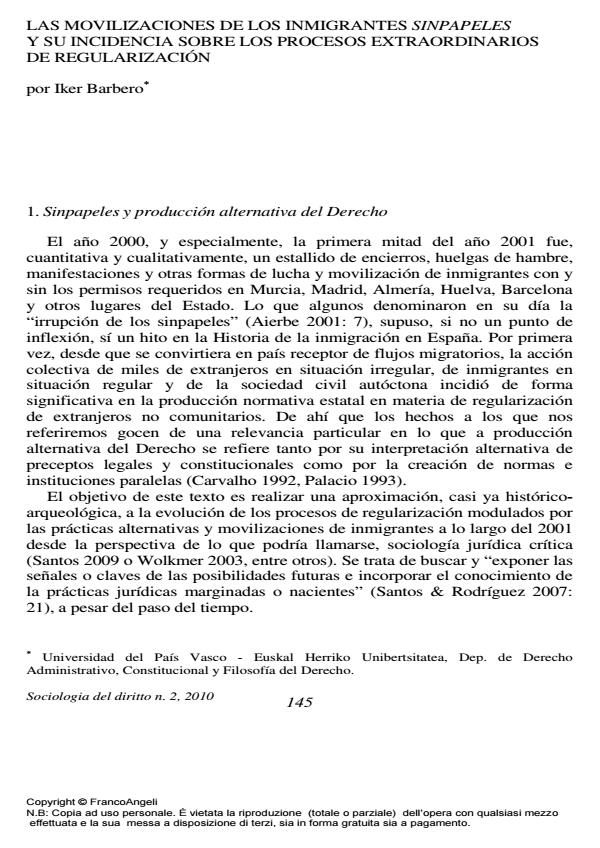The sans-papiers immigrant movements and their effects on extraordinary regularisation procedures
Journal title SOCIOLOGIA DEL DIRITTO
Author/s Iker Barbero
Publishing Year 2010 Issue 2010/2
Language Spanish Pages 25 P. 145-169 File size 540 KB
DOI 10.3280/SD2010-002007
DOI is like a bar code for intellectual property: to have more infomation
click here
Below, you can see the article first page
If you want to buy this article in PDF format, you can do it, following the instructions to buy download credits

FrancoAngeli is member of Publishers International Linking Association, Inc (PILA), a not-for-profit association which run the CrossRef service enabling links to and from online scholarly content.
The author starts by examining the social labour, political and legal circumstances leading to the movements in question, then proceeds to analyse their consequences in regulatory terms, i.e. the agreements and preliminary agreements concluded between the movements of undocumented immigrants and the various branches of public administration involved in the conflict, with a special focus on the Barcelona Agreement of 8 March 2001. This agreement, which put an end to the occupation of churches in Barcelona, not only served as a model for solving other sit-ins taking place at the same time in other parts of Spain, such as Murcia, Valencia, Madrid and Andalusia, but also provided parameters for interpreting the extraordinary regularisation procedure drawn up in June 2001. In the latter part of his article, the author draws some conclusions about this emergency procedure’s dual significance: in general, it acts as a social control mechanism of the immigrant population, while in the specific case in hand furnishing the motive that brought an end to the sit-ins and hunger strikes.
L’Autore esamina innanzitutto le circostanze socio-lavorative, politiche e giuridiche determinanti nella nascita delle mobilitazioni. Analizza poi le conseguenze normative delle mobilitazioni, vale a dire gli accordi e i preaccordi stipulati tra gli immigranti sinpapeles e le diverse amministrazioni coinvolte nel conflitto, con particolare attenzione per il cosiddetto "Accordo di Barcellona" dell’8 marzo 2001. Tale accordo, che ha posto fine alle occupazioni delle chiese di Barcellona, non solo è servito come modello per la risoluzione di altre occupazioni che avvenivano contemporaneamente in altri luoghi, come Murcia, Valencia, Madrid o in Andalusia, ma ha persino fornito parametri interpretativi per la procedura straordinaria di regolarizzazione del giugno 2001. Nella parte conclusiva l’Autore svolge alcune riflessioni sul duplice significato di questa procedura di emergenza. Essa agisce, in generale, come meccanismo di controllo sociale della popolazione immigrata e, nel caso specifico, è stata l’argomento che ha determinato la fine delle occupazioni e degli scioperi della fame.
Keywords: Immigration, Spain, Regularisation procedures, Sans-papiers movement
Iker Barbero, Las movilizaciones de los inmigrantes <i>sinpapeles</i> y su incidencia sobre los procesos extraordinarios de regularización in "SOCIOLOGIA DEL DIRITTO " 2/2010, pp 145-169, DOI: 10.3280/SD2010-002007